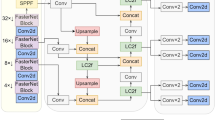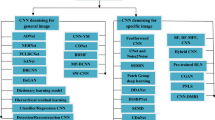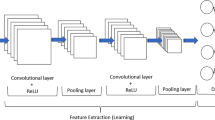Abstract
As a classic deep learning target detection algorithm, Faster R-CNN (region convolutional neural network) has been widely used in high-resolution synthetic aperture radar (SAR) and inverse SAR (ISAR) image detection. However, for most common low-resolution radar plane position indicator (PPI) images, it is difficult to achieve good performance. In this paper, taking navigation radar PPI images as an example, a marine target detection method based on the Marine-Faster R-CNN algorithm is proposed in the case of complex background (e.g., sea clutter) and target characteristics. The method performs feature extraction and target recognition on PPI images generated by radar echoes with the convolutional neural network (CNN). First, to improve the accuracy of detecting marine targets and reduce the false alarm rate, Faster R-CNN was optimized as the Marine-Faster R-CNN in five respects: new backbone network, anchor size, dense target detection, data sample balance, and scale normalization. Then, JRC (Japan Radio Co., Ltd.) navigation radar was used to collect echo data under different conditions to build a marine target dataset. Finally, comparisons with the classic Faster R-CNN method and the constant false alarm rate (CFAR) algorithm proved that the proposed method is more accurate and robust, has stronger generalization ability, and can be applied to the detection of marine targets for navigation radar. Its performance was tested with datasets from different observation conditions (sea states, radar parameters, and different targets).
摘要
更快的区域卷积神经网络(Faster R-CNN)作为一种经典深度学习目标检测算法, 已广泛应用于高分辨率合成孔径雷达和逆合成孔径雷达的图像检测。然而, 对于大多数常见的低分辨率雷达平面位置指示器(PPI)图像, 很难取得良好性能。本文以导航雷达PPI图像为例, 针对复杂背景(如海杂波)和目标特性情况, 提出一种基于海面的更快的区域卷积神经网络(Marine-Faster R-CNN)算法的海面目标检测方法。该方法利用卷积神经网络(CNN)对雷达回波生成的PPI图像进行特征提取和目标识别。首先, 为提高检测海面目标的准确率, 降低虚警率, 设计了特征融合网络FFNet(Feature Fusion Network), 并从锚点尺度、多目标检测、数据样本平衡性、尺度归一化等方面优化Faster R-CNN, 并基于此建立Marine-Faster R-CNN海面目标检测模型。然后, 利用日本无线电株式会社(JRC)导航雷达采集不同条件下的回波数据, 构建海面目标数据集。最后, 与经典Faster R-CNN方法和恒虚警率算法对比, 证明所提方法准确率更高, 稳健性更佳, 泛化能力更强, 可应用于导航雷达海面目标检测。它的性能经过了来自不同观测条件(海况、雷达参数和不同目标)数据集的验证。
Similar content being viewed by others
References
Chen XL, Guan J, Bao ZH, et al., 2014. Detection and extraction of target with micromotion in spiky sea clutter via short-time fractional Fourier transform. IEEE Trans Geosci Remote Sens, 52(2):1002–1018. https://doi.org/10.1109/TGRS.2013.2246574
Chen XL, Guan J, Li XY, et al., 2015. Effective coherent integration method for marine target with micromotion via phase differentiation and radon-Lv’s distribution. IET Radar Sonar Navig, 9(9):1284–1295. https://doi.org/10.1049/iet-rsn.2015.0100
Daniels DJ, 2010. Radar systems. In: Daniels DJ (Ed.), EM Detection of Concealed Targets. Wiley-IEEE Press, Hoboken, USA, p.164–213. https://doi.org/10.1002/9780470539859.ch5
Dong RC, Xu DZ, Zhao J, et al., 2019. Sig-NMS-based faster R-CNN combining transfer learning for small target detection in VHR optical remote sensing imagery. IEEE Trans Geosci Remote Sens, 57(11):8534–8545. https://doi.org/10.1109/TGRS.2019.2921396
Guan J, Chen XL, Huang Y, et al., 2012. Adaptive fractional Fourier transform-based detection algorithm for moving target in heavy sea clutter. IET Radar Sonar Navig, 6(5): 389–401. https://doi.org/10.1049/iet-rsn.2011.0030
He KM, Zhang XY, Ren SQ, et al., 2016. Deep residual learning for image recognition. Proc IEEE Conf on Computer Vision and Pattern Recognition, p.770–778. https://doi.org/10.1109/CVPR.2016.90
He KM, Gkioxari G, Dollár P, et al., 2020. Mask R-CNN. IEEE Trans Patt Anal Mach Intell, 42(2):386–397. https://doi.org/10.1109/TPAMI.2018.2844175
Jalil A, Yousaf H, Baig MI, 2016. Analysis of CFAR techniques. Proc 13th Int Bhurban Conf on Applied Sciences and Technology, p.654–659. https://doi.org/10.1109/IBCAST.2016.7429949
LeCun Y, Bottou L, Bengio Y, et al., 1998. Gradient-based learning applied to document recognition. Proc IEEE, 86(11):2278–2324.https://doi.org/10.1109/5.726791
Liu ZG, Lyu Y, Wang LY, 2020. Detection approach based on an improved faster RCNN for brace sleeve screws in high-speed railways. IEEE Trans Instrum Meas, 69(7): 4395–4403. https://doi.org/10.1109/TIM.2019.2941292
Maresca S, Bogoni A, Ghelfi P, 2019. CFAR detection applied to MIMO radar in a simulated maritime surveillance scenario. Proc 16th European Radar Conf, p.157–160.
Mou XQ, Chen XL, Su NY, et al., 2019a. Motion classification for radar moving target via STFT and convolution neural network. J Eng, 2019(19):6287–6290. https://doi.org/10.1049/joe.2019.0179
Mou XQ, Chen XL, Guan J, et al., 2019b. Marine target detection based on improved faster R-CNN for navigation radar PPI images. Proc Int Conf on Control, Automation and Information Sciences, p.1–5. https://doi.org/10.1109/iccais46528.2019.9074588
Ren SQ, He KM, Girshick R, et al., 2017. Faster R-CNN: towards real-time object detection with region proposal networks. IEEE Trans Patt Anal Mach Intell, 39(6): 1137–1149. https://doi.org/10.1109/TPAMI.2016.2577031
Tian C, Tian YH, Ma HW, et al., 2016. Small target detection for solid-state marine radar. Proc CIE Int Conf on Radar, p.1–4. https://doi.org/10.1109/RADAR.2016.8059302
Trunk GV, George SF, 1970. Detection of targets in non-Gaussian sea clutter. IEEE Trans Aerosp Electron Syst, AES-6(5):620–628. https://doi.org/10.1109/TAES.1970.310062
Wang L, Tang J, Liao QM, 2019. A study on radar target detection based on deep neural networks. IEEE Sens Lett, 3(3):7000504. https://doi.org/10.1109/LSENS.2019.2896072
Ward KD, Tough RJA, Watts S, 2007. Sea clutter: scattering, the K distribution and radar performance. Waves Random Compl Med, 17(2):233–234. https://doi.org/10.1080/17455030601097927
Yavari E, Boric-Lubecke O, Yamada S, 2016. Radar principles. In: Boric-Lubecke O, Lubecke VM, Droitcour AD, et al. (Eds.), Doppler Radar Physiological Sensing. Wiley, Hoboken, USA, p.21–38. https://doi.org/10.1002/9781119078418.ch2
Yu XH, Chen XL, Hu WC, et al., 2016. An overview of marine moving target detection via high-resolution sparse representation. Proc CIE Int Conf on Radar, p.1–5. https://doi.org/10.1109/RADAR.2016.8059231
Author information
Authors and Affiliations
Corresponding author
Additional information
Project supported by the Shandong Provincial Natural Science Foundation, China (No. ZR2021YQ43), the National Natural Science Foundation of China (Nos. U1933135 and 61931021), and the Major Science and Technology Project of Shandong Province, China (No. 2019JZZY010415)
Contributors
Xiaolong CHEN and Xiaoqian MU designed the research. Ningbo LIU and Wei ZHOU provided the radar data. Xiaoqian MU processed the data. Xiaolong CHEN drafted the paper. Xiaolong CHEN, Xiaoqian MU, and Jian GUAN revised and finalized the paper.
Compliance with ethics guidelines
Xiaolong CHEN, Xiaoqian MU, Jian GUAN, Ningbo LIU, and Wei ZHOU declare that they have no conflict of interest.
Rights and permissions
About this article
Cite this article
Chen, X., Mu, X., Guan, J. et al. Marine target detection based on Marine-Faster R-CNN for navigation radar plane position indicator images. Front Inform Technol Electron Eng 23, 630–643 (2022). https://doi.org/10.1631/FITEE.2000611
Received:
Accepted:
Published:
Issue Date:
DOI: https://doi.org/10.1631/FITEE.2000611
Key words
- Marine target detection
- Navigation radar
- Plane position indicator (PPI) images
- Convolutional neural network (CNN)
- Faster R-CNN (region convolutional neural network) method




